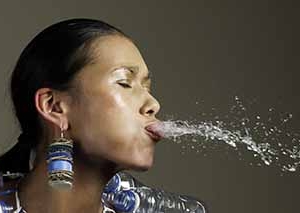
The human body is 60-70% water. The brain and heart are composed of 75% water and the lungs are composed of 85% water. Dehydration is defined as water loss that exceeds the amount of water you take in.
A 10 percent water loss can be life-threatening and can lead to seizures or respiratory arrest and cardiac arrest.
Dehydration causes the blood to thicken, which causes low blood pressure. Low blood pressure signals the brain to increase the heart rate to compensate. Respiration’s will increase to deliver more oxygen to the brain. All of these processes will lead to more severe dehydration, seizures, respiratory and heart complications if not treated immediately.
How Does Dehydration Occur?
Dehydration is the loss of water through physiological processes such as urination, sweating, vomiting, diarrhea, and even breathing.
Just a 5 percent water loss can cause discomfort, headache, dizziness and generalized weakness.
Statistically, most heart attacks occur during the morning hours. This is because the body is in a mild state of dehydration by not taking in water for 6-8 hours during the night.
Imagine going 8 hours — from 9-5 — without drinking anything at all. That’s how depleted the body is when you wake up in the morning.
Your first glass or bottle of water should be immediately after waking up. Leave a glass of water or a bottle of water on your nightstand to remind you.

Doctors recommend drinking 8 cups of water per day. That is equal to four 16 ounce bottles of water. If you’re not sure how much water to drink per day, or if you have a medical condition that limits your water intake, consult your health care provider.

What Are the Signs and Symptoms of Dehydration?
The first signs and symptoms of mild dehydration are thirst, headaches, dizziness, and dark colored urine.
The more serious symptoms are shown below.

Remember that dehydration occurs when you don’t drink enough water to replace the water you lose through normal physiological processes such as sweating, urinating or breathing (respirations).
Urine Color
Your urine color is another indicator of your hydration status. When you urinate, look in the bowl to see what color the water is.
Check the chart below. If the water in the bowl is the color of #1, 2, and 3, you are hydrated. If the water in the bowl looks like #7 or 8, you are probably dehydrated and should drink water AND check to see if you have the other signs and symptoms listed above.

If you have dark urine plus the symptoms above, you should contact your health care provider!
What is Electrolyte Imbalance?
Electrolytes are very important to maintain electrical impulses across all cell membranes. The cells in the heart, brain and muscles need the proper balance of electrolytes to receive electrical impulses.
The main three electrolytes in the blood are Potassium, Sodium (salt), and calcium.
Electrolyte imbalance is usually not seen in mild cases of dehydration.
Electrolyte imbalance usually occurs when there is a large loss of water volume from the body such as through excessive sweating, blood loss, excessive vomiting or excessive diarrhea.
The body can be mildly dehydrated without a loss of electrolytes because the kidneys work to maintain the proper balance of electrolytes.
Athletes lose electrolytes in the form of potassium and sodium as they sweat. Drinking a rehydrating solution that contains sugar, potassium and salt will replace the loss of water and electrolytes. An example of a rehydrating solution is Gatorade.
Also, people who have an addiction to laxatives are at increased risk for electrolyte imbalance.
How is Dehydration Treated?
The first treatment of choice for mild dehydration is drinking water or drinking a rehydration solution such as Gatorade.
Moderate to severe dehydration are treated by rehydrating the body with hydration fluids such as normal saline which contains 0.9% sodium chloride.
Normal saline contains 2 of the electrolytes that the body needs: sodium and chloride. Normal saline can be administered via intravenous IV infusion in the hospital or in the home by licensed health care providers.

Doctors recommend drinking 6-8 cups of water per day (depending upon your weight, age and other factors). If you’re not sure how much water to drink per day, or if you have a medical condition that limits your water intake, consult your health care provider.
Severe cases of dehydration are treated in the emergency room by infusing fluids such as normal saline with potassium, D5W (water with sugar) or Lactated Ringer’s, which contains electrolytes.
This has been your Medical Minute.
DISCLAIMER
Any medical information published on this blog is for your general information only and is not intended as a substitute for informed medical advice. You should not take any action before consulting with your personal physician or a health care provider. Sandrarose.com and its affiliates cannot be held liable for any damages incurred by following information found on this blog.
Photos by Irina_Strelnikova / Getty Images, Zoviart / Getty Images, Antonio Guillem / Getty Images




